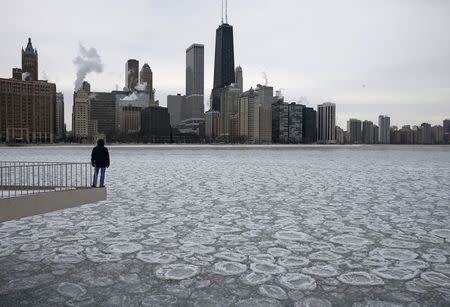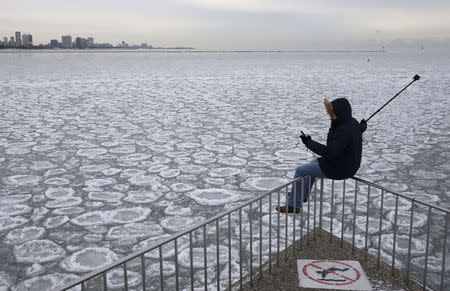Brutal cold snap hits eastern half of U.S.
By Mary Wisniewski CHICAGO (Reuters) - A bitter cold snap is freezing most of the eastern half of the United States, driving the mercury below zero in the Midwest on Monday, with possible freezing temperatures as far south as Atlanta later this week, forecasters said. The brutal weather pattern, brought on by a polar air mass pushing south from Canada, is impressive but not out of the ordinary for this time of year, said Tom Kines, senior meteorologist for AccuWeather.com. "When it comes right down to it, it's January," said Kines. The pattern is expected to continue into next week. On the plus side, the weather is expected to be mostly dry, rather than stormy. Some areas will get snow, including about 4 inches in Chicago and maybe 1 to 2 inches in the Washington, D.C., area by Tuesday morning, which could cause traffic problems, said National Weather Service lead forecaster Bob Oravec. The cold and wind did not deter lunchtime smokers from standing outside downtown Chicago office buildings on Monday, but some said they were taking fewer breaks. "It always makes me wonder why people live here," said Erik Feick, 34. He said he would consider going south, if not for family. Cathy Bennett, 46, a lifelong Chicagoan, said she hates the cold and plans a move to North Carolina or Florida. "As soon as I can, I'm out of here," Bennett said. "We're in for months of this." Lawrence Brown, who works with the Detroit homeless, said he sees one advantage to the bitter weather: it brings in people for help who otherwise might stay outside. "I see a lot of new faces," said Brown, a resident specialist with Detroit Rescue Mission Ministries. "We have a facility for substance abuse treatment. If they need it we have a caseworker." Brown said the shelter, which usually doesn't open until the evening, stays open all day when the weather is brutal so people can stay warm. Some people, and even animals, like the cold. Dan Cassidy, general curator for the Henry Doorly Zoo and Aquarium in Omaha, Nebraska, said the zoo's polar bears and Siberian tigers do not mind at all. Surprisingly, neither do cheetahs, which come from a warm climate. "They'll go out if they have a chance every day," said Cassidy. "But the giraffe wouldn't think about it." (Reporting by Mary Wisniewski; Editing by Eric Beech)


